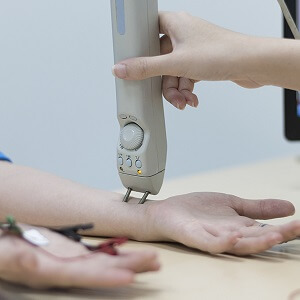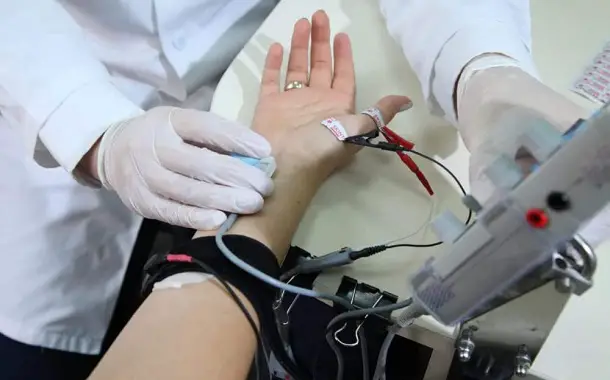Nerve Conduction Test Cost
Last Updated on September 19, 2023
Written by CPA Alec Pow | Content Reviewed by ![]() CFA Alexander Popinker
CFA Alexander Popinker
Did you know that the human body acts as an electric generator? Nerves and muscles generate electrical signals that transmit messages from and to the brain. Sensory nerves transmit information about the environment to the brain, and motor nerves transmit signals from the brain to activate the muscles. Injuries or diseases that affect nerves or muscles can slow down or even stop the transmission of these electrical signals. One of the most frequently used tests for the objectification of electrical activity is the nerve conduction test, known also as NCS.
How Much Does a Nerve Conduction Test Cost?
The amount of money you are going to spend on a nerve conduction test will depend on several factors such as the type of tests being performed, the geographical location, and the medical clinic you choose to have this procedure done.
Expect to pay anywhere between $750 and $4,500 for a nerve conduction test, if more than one test has to be done. The cost of most tests will be anywhere between $550 and $1,400 per extremity.
In case this procedure is deemed medically necessary, you should contact your health insurance provider and ask if they cover the costs. If so, you will be responsible only for the co-pay and/or deductibles.
For instance, a patient without insurance in Tampa Florida had to pay around $850 for a nerve conduction test at a local doctor’s office.
The cost of a nerve conduction test would be anywhere between $750 and $850, according to the Health Board website. Other websites say that the cost of this procedure is somewhere around $850 – $950.
Be prepared to pay $600 to $4,700 for a nerve conduction test at a medical clinic like One Call Medical.
Nerve conduction test – short presentation
Nerve conduction testing is often performed simultaneously with the EMG to determine if the nerves are functioning normally. The doctor performing the test will apply electrodes to the skin in different places along the nerve to be examined, and then he will perform nerve stimulation with the help of an electric current. Considering that the electrical stimulus travels down the nerve path, the electrodes placed along it will record the signal and the speed with which the signal travels.
You might also like our articles on the cost of EMG testing, spinal cord stimulation, or stress tests with Echo.
In healthy nerves, electrical signals travel at up to 200 km per hour. However, if the nerve is damaged or strangulated in a certain area (as in carpal tunnel syndrome), the signal will be weaker and the speed will be lower. By stimulating the nerves in various places, the doctor can determine the exact level of the injury.
Although at first, the patient may be slightly surprised by the sensation given by the electrical stimulation, it is not painful and most patients feel comfortable during the procedure.
The examination usually lasts between 30 and 90 minutes. The time required for the examination cannot be accurately determined before the procedure begins.
The orthopedic doctor can recommend EMG and nerve conduction tests for various conditions that may be caused by compression of a nerve, especially in the area of the arm, elbow, or wrist. These conditions are called “compression neuropathies” and include:
- cervical radiculopathy (compression of the nerve roots that leave the spine at the level of the neck);
- carpal tunnel syndrome (pressure on the median nerve in the place where it passes between the bones of the wrist and under the transverse ligament);
- cubital tunnel syndrome (compression of the ulnar nerve where it passes through the back of the elbow).
Electrodiagnostic tests can also be used to determine the severity of nerve damage following an accident and to study the effects of diseases such as diabetes.
Which are the additional expenses?
Your overall costs may increase if during the procedure the physician discovers something wrong with your body and you need treatment and medication.
If the nerve conduction test does not offer the desired results, additional tests may be required.
Important things to consider
 Be sure to tell your doctor about any over-the-counter or prescription medications you are taking, including dietary supplements. It is also important to tell your doctor if you have a bleeding disorder or if you have a pacemaker or implantable defibrillator.
Be sure to tell your doctor about any over-the-counter or prescription medications you are taking, including dietary supplements. It is also important to tell your doctor if you have a bleeding disorder or if you have a pacemaker or implantable defibrillator.
Before a nerve conduction test, do not apply lotions or creams to the skin on the day of the exam! It is recommended to wear comfortable clothes that do not obstruct the area that the doctor will evaluate (shoulder, back regions, thigh, etc.).
There are no other restrictions or special precautions to follow before testing. Contraindications include ongoing anticoagulant treatments, the presence of a pacemaker, or extensive skin infections. For this reason, it is necessary to inform the doctor of the complete list of medicines you are taking.
Tips for saving money
As this procedure is considered a necessary test, health insurance companies may be able to cover up to 70% or more of the price. Remember that the majority of insurance companies will require this type of procedure before they approve any related surgery.
If you don’t have health insurance, you should ask the doctor’s office or hospital if they offer a cash discount. The majority of the offices are more than happy to offer a discount if you pay up in advance.


Leave a Reply
Want to join the discussion?Feel free to contribute!